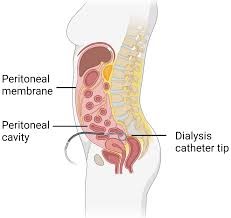A nurse is caring for a client who arrives at the emergency department and reports vomiting and diarrhea for the past 3 days. The client's serum potassium level is 2.8 mEq/L. Which of the following interventions should the nurse implement first?
Listen to the client's bowel sounds.
Initiate cardiac monitoring for the client.
Check the client's hand grasps
Administer an IV potassium drip
The Correct Answer is B
Choice A reason:
Listening to the client's bowel sounds should not be implemented. While assessing bowel sounds is important, it is not the highest priority in this situation. The client's low serum potassium level indicates the potential for serious cardiac arrhythmias, so actions related to monitoring and addressing this electrolyte imbalance are more critical.
Choice B reason:
Initiate cardiac monitoring for the client is the correct answer. A serum potassium level of 2.8 mEq/L is significantly low and can lead to life-threatening cardiac arrhythmias. Initiating cardiac monitoring is crucial to assess the client's heart rhythm and ensure that any potential abnormalities are identified promptly.
Choice C reason:
Check the client's hand grasps should not be implemented. Assessing the client's hand grasps can provide information about muscle strength, but it is not the immediate priority when the client has a critically low potassium level.
Choice D reason:
Administer an IV potassium drip should not be implemented. Administering IV potassium is important for correcting the potassium imbalance, but the priority is to assess and monitor the client's cardiac status first. Rapid administration of potassium can lead to cardiac arrhythmias, so it's important to ensure the heart's stability through cardiac monitoring before administering potassium.
Nursing Test Bank
Naxlex Comprehensive Predictor Exams
Related Questions
Correct Answer is C
Explanation
Choice A Reason:
Diplopia is incorrect. Diplopia is double vision and is not a specific sign of malnutrition.
Choice B Reason:
Hyperproteinemia is incorrect - Malnutrition often leads to hypoalbuminemia (low levels of albumin, a protein), not hyperproteinemia.
Choice C Reason:
Cachexia is correct. Cachexia refers to a state of severe malnutrition and muscle wasting that can occur in individuals with chronic illnesses, especially advanced cancer, heart failure, or certain inflammatory conditions. It is characterized by significant weight loss, muscle atrophy, weakness, and fatigue. Cachexia goes beyond simple malnutrition and is a more severe manifestation of nutritional deficiency.
Choice D Reason:
Hypermagnesemia is incorrect - Malnutrition is more likely to cause deficiencies in minerals like magnesium, not excess levels (hypermagnesemia).
Correct Answer is A
Explanation
Placing the client in high-Fowler's position is the appropriate action. When administering peritoneal dialysis, the nurse should place the client in a high-Fowler's position. This position helps promote the flow of dialysate into and out of the peritoneal cavity and assists with proper drainage. The high-Fowler's position allows for gravity to aid in the movement of fluid and helps prevent leakage of fluid back into the catheter.
Choice B Reason:
Chilling the dialysate before administration is not necessary and could cause discomfort to the client. Dialysate should be warmed to body temperature before use.
Choice C Reason:
Hanging the drainage bag below the client's abdomen is incorrect. The drainage bag should be positioned below the level of the abdomen to allow for proper drainage by gravity, but it should not be hung too low as this can lead to excessive drainage and dehydration.
Choice D Reason:
Using clean technique to access the catheter is incorrect. Sterile technique is required when accessing the peritoneal dialysis catheter to prevent infection. Peritoneal dialysis involves direct access to the peritoneal cavity, which is considered a sterile body cavity.

Whether you are a student looking to ace your exams or a practicing nurse seeking to enhance your expertise , our nursing education contents will empower you with the confidence and competence to make a difference in the lives of patients and become a respected leader in the healthcare field.
Visit Naxlex, invest in your future and unlock endless possibilities with our unparalleled nursing education contents today
Report Wrong Answer on the Current Question
Do you disagree with the answer? If yes, what is your expected answer? Explain.
Kindly be descriptive with the issue you are facing.
